Research indicates that daily water consumption plays a significant role in how the body manages stress. A study published in the Journal of Applied Physiology reveals that adults who consume less than six cups of water or other beverages each day experience a 50 percent increase in levels of the stress hormone cortisol when faced with pressure.
The study, led by Daniel Kashi, a researcher at Liverpool John Moores University in England, highlights the connection between hydration and stress response. Kashi stated in an email to The Epoch Times, “Dehydration doesn’t just affect your physical health, it can also make your stress response stronger.”
The implications of elevated cortisol levels are concerning. Over time, chronic high levels of cortisol have been associated with various health issues, including heart disease, kidney issues, and diabetes.
Understanding the relationship between hydration and stress is critical, especially in today’s fast-paced world where many individuals struggle to maintain adequate fluid intake. The study underscores the need for awareness about hydration and its broader health impacts.
In conclusion, ensuring sufficient daily water intake may not only improve physical health but also help mitigate stress responses. As more research emerges in this area, public health guidelines may need to reflect the importance of hydration in managing overall well-being.







































































